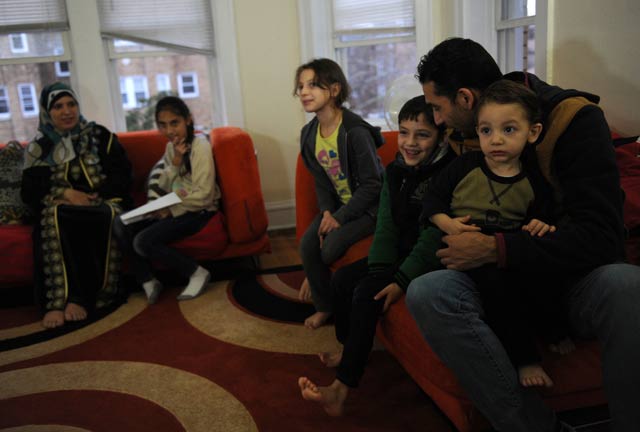
It hurts, she said, to hear politicians are trying to stop families just like hers from finding a safe haven, branding all Syrians a security threat in the wake of the Paris attacks.
Why the US should welcome Syrian refugees without prejudice
"Just like any mother who loves her children and wants to see them sleep peacefully, so do I. Just like any mother wants to feed her children, so do I," she said.
 PHOTO: AFP
PHOTO: AFPThey must not realise, she said, that like her these are people forced from their homes -- consumed with worry for the loved ones left behind. This is what she would tell them all, if she could.
As her American neighbours prepare to celebrate Thanksgiving with their families on Thursday, Mshymish, 27, longs for a homeland that no longer exists.
Republican candidates press Syrian refugee opposition
They had a good life before the war began. They were comfortable, safe and happy, surrounded by family and friends.
Her husband went to a couple of demonstrations in the early, peaceful days of the protest movement against President Bashar al-Assad's regime, but mostly stayed out of the intensifying conflict.
Until a car full of "thugs" drove up and opened fire as he sat at a cafe with five friends in Homs on October 15, 2011.
"I was the only one who survived. Everybody else was killed," Ismil Alrife, 38, told AFP.
Republican Ben Carson compares Syrian refugees to ‘rabid dogs’
Watching his friends die on the street was just the beginning, as fear came to shadow their days.
 PHOTO: AFP
PHOTO: AFPNow that Alrife was injured -- the bullets severed the main nerve in his right leg and he needs a cane to walk -- they were afraid he would become a target for the regime, indiscriminate in rounding up potential "trouble-makers."
Trying to leave was also dangerous. So they stayed, even as the war intensified, making it impossible for their three children to go to school and difficult to even buy groceries.
Then a missile struck their apartment building. As the walls crumbled around them, they flung their children under the bed and prayed. They escaped with their lives, and little else.
Obama hits out as Republicans seek to halt Syria refugee program
The family of five joined a steady stream of refugees weaving their way through the war-torn country, reaching the border with Jordan in July 2012.
They waited for darkness to fall and walked 40 kilometers though the mountains in hopes of avoiding Syrian patrols.
After more than two years in Jordan, they were given clearance to emigrate to the United States, arriving in Chicago during one of its coldest winters ever.
The children -- now aged 11, 9, 6 and 20 months -- have had an easier time adjusting to the new language and culture.
Obama urges Russia to join renewed effort to eliminate Islamic State
They are learning English at school and, like generations of immigrants before them, sometimes act as interpreters for their parents.
"We feel very happy to be here and be safe, but at the same time it's not easy for anyone to leave home," Mshymish said.
The United States has admitted fewer than 2,180 Syrian refugees out of the nearly 4.3 million who have registered with the United Nations since the conflict began in 2011.
President Barack Obama pledged to resettle 10,000 more in the next year, but Syrian refugees have become a political football in the wake of the November 13 attacks which killed 130 in Paris.
Obama rules out US troops on the ground to fight Islamic State
More than half of state governors oppose hosting any more Syrians and the House of Representatives voted to ban refugees from either Syria or Iraq without tougher screening measures -- to prevent militants posing as refugees from slipping into the West to stage attacks.
Suzanne Akhras Sahloul, director of the Syrian Community Network non-profit group, called the backlash against refugees "despicable" -- coming against a backdrop of anti-Muslim rhetoric from several Republican presidential candidates.
"I'm very disappointed in our country," said Sahloul, whose group helps refugees adjust to life in the United States.
"What happened to us that we are now closing our doors to people who are escaping terrorism, trauma and death?"
Chicago -- one of the nation's largest, most diverse cities -- has welcomed just 18 families of Syrian refugees.
The desperate plight of the Syrian refugees
Most live within walking distance of the Alrife family in a bustling immigrant neighbourhood where shopkeepers speak Arabic and sell the thick, strong coffee that reminds them of home.
Abdullah Taha, 44, arrived with his wife and three children in September.
The former taxi driver was imprisoned for a month after driving some customers into the wrong neighbourhood of Damascus in December 2011.
He said he was tortured by the regime while his desperate family, fearing the worst, searched the streets for his body.
Taha fled to Lebanon soon after his release, but found life there too "chaotic."
He said he was grateful to the kind people who made his family feel welcome in Chicago.
But his days are filled with fears for his parents, siblings and all those trapped in Syria. And he struggles to contain his anger when he hears refugees branded as terrorists.
"I get very upset when some people or candidates for the US election, they invent anything to use it during the election, anything, and they tarnish our image," he told AFP. "It's not the reality, we're not like this," he said.
"I would give my life to them just to prove that those millions of Syrians are innocent and have nothing to do with terrorism."


1723278472-0/BeFunky-collage-(4)1723278472-0-165x106.webp)


1732518687-0/Copy-of-Untitled-(78)1732518687-0-270x192.webp)











COMMENTS
Comments are moderated and generally will be posted if they are on-topic and not abusive.
For more information, please see our Comments FAQ